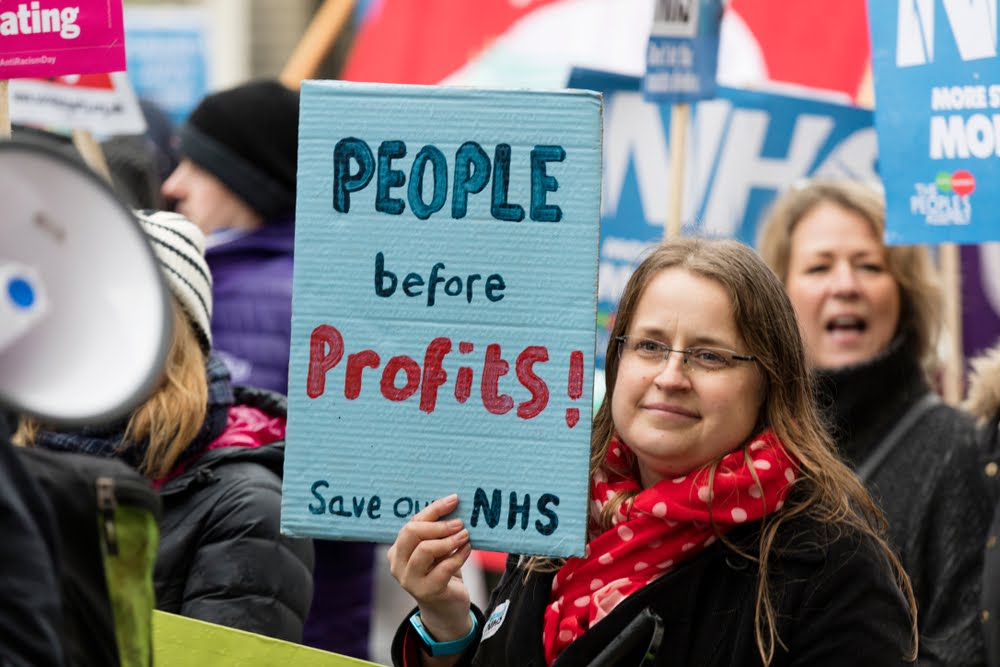A £5 billion deal to extend the use of the private sector to treat NHS patients is being blocked by the Treasury according to reports from inside the NHS. The deal, being pushed by Health Secretary, Matt Hancock and NHS England is needed they say to deal with the large backlog of work that has built up during the Covid-19 crisis, which could see the NHS’ waiting list rise to 10 million by Christmas.
The Guardian reports that an agreement had been reached at the beginning of the month between NHS England and the leading private hospital companies, including Spire, Ramsay and HCA International, but that the Treasury prevented any announcement because it was not satisfied that it represented good value for money.
The new arrangement had intended to extend the deal struck in March, allowing the government to take control of the private hospital sectors’ 8000 beds, 680 operating theatres and 20,000 staff, adding to the 3,000 theatres in NHS hospitals.
Under the deal the government paid all operating costs for the private hospitals including rent, external interest payments and staff. This is thought to be costing the DHSC about £400 million a month.
NHS can’t “switch on” full capacity
Consensus has grown within the NHS about the need for the extra capacity as managers face up to trying to organise services around the social distancing regulations, which they predict will limit NHS capacity to 60-70% of the maximum, and there is already speculation about whether the deal could become longer lasting.
The NHS Confederation, the organisation that represents NHS managers believes that getting the NHS back to normal involves putting in place “an ongoing arrangement with the private sector” which “will be vital to provide capacity to respond to the backlog of treatment.”
It has already warned the government in a letter, that: “It will not be possible simply to ‘switch on’ NHS services.”
Stringent infection control measures will restrict hospital admissions, and managers are reconfiguring wards with less beds. Many older buildings will be particularly difficult to work in due to narrow corridors and smaller rooms.
Often crowded A&Es will have to be redesigned: and gone are the days of large rooms full of people waiting for out-patient appointments.
The changeover times for operating theatres and scans will lengthen as deep cleans will be needed and extra time for donning PPE.
Nigel Edwards, head of the think-tank, the Nuffield Trust told the Independent: “There will still be a major capacity constraint for years to come. We will need to expand the level of elective capacity even to catch up. And I suspect that probably means using the independent sector for at least the rest of this financial year. If not beyond.”
“Paid to stand empty”?
Despite the need for extra capacity the Guardian reports that Treasury officials remain concerned that over the course of the previous deal the private hospitals were not used adequately and believes the evidence submitted by the DHSC to justify the extension of this deal to the end of the year or March 2021, is flimsy and inadequate.
Under the original contract major private hospitals, including HCA International, BMI/Circle Healthcare, Ramsay Healthcare, Spire Healthcare and Care UK, were supposed to be used for non-Covid work, but doubts have been raised about the extent to which they have been used.
Colin Hutchinson, a consultant ophthalmologist in the NHS and chair of the anti-privatisation campaign group Doctors for the NHS, told the Guardian that: “private health facilities have been very, very quiet over recent months. They have been paid to stand empty, by and large.”
Consultants in the private sector have told the media that the hospitals have been empty and doctors have been “twiddling their thumbs”.
The chairman of the Federation of Independent Practitioner Organisations, which represents private consultants, said: ‘The money being poured into the private sector is a total waste.”
However, David Hare chief executive of the Independent Healthcare Providers Network argues that private sector hospitals have offered substantial support to the NHS and that their relationship ‘has changed before our eyes’.
Cancer care
In an article for the Health Service Journal he cites the transfer of oncology at the University Hospitals Plymouth Trust to the local Nuffield Health hospital “which is providing facilities and staff to treat cancer patients and is helping to free up resources in the local Derriford NHS Hospital.” and in Southampton the Spire Hospital “is hosting the local trust’s entire oncology and haematology services.”
In London he says “Bupa Cromwell and HCA hospitals have joined forces with the London “Cancer Hub” to help deliver time-critical cancer treatment to NHS patients.”
As yet there are no published figures to show the use of these facilities and the NHS Support Federation has sent a letter to the Department of Health and Social Care requesting the full disclosure of this deal and the future plans.
Earlier figures around the Nightingale hospitals, which included some staff and facilities from private hospitals, showed that around 50 patents were treated in the 4000-bed London unit before it was placed on standby (i.e. closed) at the beginning of May.
See our article 10 questions to ask about the NHS deal with private hospitals
Dear Reader,
If you like our content please support our campaigning journalism to protect health care for all.
Our goal is to inform people, hold our politicians to account and help to build change through evidence based ideas.
Everyone should have access to comprehensive healthcare, but our NHS needs support. You can help us to continue to counter bad policy, battle neglect of the NHS and correct dangerous mis-infomation.
Supporters of the NHS are crucial in sustaining our health service and with your help we will be able to engage more people in securing its future.
Please donate to help support our campaigning NHS research and journalism.


